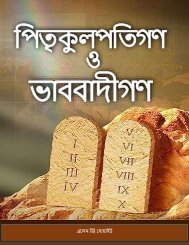Finishing the Race
Of all the games instituted among the Greeks and the Romans, the races were the most ancient and the most highly esteemed … The contests were governed by strict regulations, from which there was no appeal. Those who desired their names entered as competitors for the prize had first to undergo a severe preparatory training. Harmful indulgence of appetite, or any other gratification that would lower mental or physical vigour, was strictly forbidden. For one to have any hope of success in these trials of strength and speed, the muscles must be strong and supple, and the nerves well under control. Every movement must be certain, every step swift and unswerving; the physical powers must reach the highest mark.
Of all the games instituted among the Greeks and the Romans, the races were the most ancient and the most highly esteemed … The contests were governed by strict regulations, from which there was no appeal. Those who desired their names entered as competitors for the prize had first to undergo a severe preparatory training. Harmful indulgence of appetite, or any other gratification that would lower mental or physical vigour, was strictly forbidden. For one to have any hope of success in these trials of strength and speed, the muscles must be strong and supple, and the nerves well under control. Every movement must be certain, every step swift and unswerving; the physical powers must reach the highest mark.
You also want an ePaper? Increase the reach of your titles
YUMPU automatically turns print PDFs into web optimized ePapers that Google loves.
It was not long after that a learned Catholic doctor, engaging in controversy with him,<br />
exclaimed: "We were better to be without God's laws than <strong>the</strong> pope's." Tyndale replied: "I<br />
defy <strong>the</strong> pope and all his laws; and if God spare my life, ere many years I will cause a boy<br />
that driveth <strong>the</strong> plow to know more of <strong>the</strong> Scripture than you do."--Anderson, Annals of <strong>the</strong><br />
English Bible, page 19. The purpose which he had begun to cherish, of giving to <strong>the</strong> people<br />
<strong>the</strong> New Testament Scriptures in <strong>the</strong>ir own language, was now confirmed, and he<br />
immediately applied himself to <strong>the</strong> work. Driven from his home by persecution, he went to<br />
London, and <strong>the</strong>re for a time pursued his labours undisturbed. But again <strong>the</strong> violence of <strong>the</strong><br />
papists forced him to flee. All England seemed closed against him, and he resolved to seek<br />
shelter in Germany. Here he began <strong>the</strong> printing of <strong>the</strong> English New Testament. Twice <strong>the</strong><br />
work was stopped; but when forbidden to print in one city, he went to ano<strong>the</strong>r. At last he<br />
made his way to Worms, where, a few years before, Lu<strong>the</strong>r had defended <strong>the</strong> gospel before<br />
<strong>the</strong> Diet. In that ancient city were many friends of <strong>the</strong> Reformation, and Tyndale <strong>the</strong>re<br />
prosecuted his work without fur<strong>the</strong>r hindrance. Three thousand copies of <strong>the</strong> New<br />
Testament were soon finished, and ano<strong>the</strong>r edition followed in <strong>the</strong> same year.<br />
With great earnestness and perseverance he continued his labours. Notwithstanding <strong>the</strong><br />
English authorities had guarded <strong>the</strong>ir ports with <strong>the</strong> strictest vigilance, <strong>the</strong> word of God was<br />
in various ways secretly conveyed to London and <strong>the</strong>nce circulated throughout <strong>the</strong> country.<br />
The papists attempted to suppress <strong>the</strong> truth, but in vain. The bishop of Durham at one time<br />
bought of a bookseller who was a friend of Tyndale his whole stock of Bibles, for <strong>the</strong><br />
purpose of destroying <strong>the</strong>m, supposing that this would greatly hinder <strong>the</strong> work. But, on <strong>the</strong><br />
contrary, <strong>the</strong> money thus furnished, purchased material for a new and better edition, which,<br />
but for this, could not have been published. When Tyndale was afterward made a prisoner,<br />
his liberty was offered him on condition that he would reveal <strong>the</strong> names of those who had<br />
helped him meet <strong>the</strong> expense of printing his Bibles. He replied that <strong>the</strong> bishop of Durham<br />
had done more than any o<strong>the</strong>r person; for by paying a large price for <strong>the</strong> books left on hand,<br />
he had enabled him to go on with good courage.<br />
Tyndale was betrayed into <strong>the</strong> hands of his enemies, and at one time suffered<br />
imprisonment for many months. He finally witnessed for his faith by a martyr's death; but<br />
<strong>the</strong> weapons which he prepared have enabled o<strong>the</strong>r soldiers to do battle through all <strong>the</strong><br />
centuries even to our time. Latimer maintained from <strong>the</strong> pulpit that <strong>the</strong> Bible ought to be<br />
read in <strong>the</strong> language of <strong>the</strong> people. The Author of Holy Scripture, said he, "is God Himself;"<br />
and this Scripture partakes of <strong>the</strong> might and eternity of its Author. "There is no king,<br />
emperor, magistrate, and ruler . . . but are bound to obey . . . His holy word." "Let us not<br />
take any bywalks, but let God's word direct us: let us not walk after . . . our forefa<strong>the</strong>rs, nor<br />
seek not what <strong>the</strong>y did, but what <strong>the</strong>y should have done."--Hugh Latimer, "First Sermon<br />
Preached Before King Edward VI."<br />
Barnes and Frith, <strong>the</strong> faithful friends of Tyndale, arose to defend <strong>the</strong> truth. The Ridleys<br />
and Cranmer followed. These leaders in <strong>the</strong> English Reformation were men of learning, and<br />
150


















